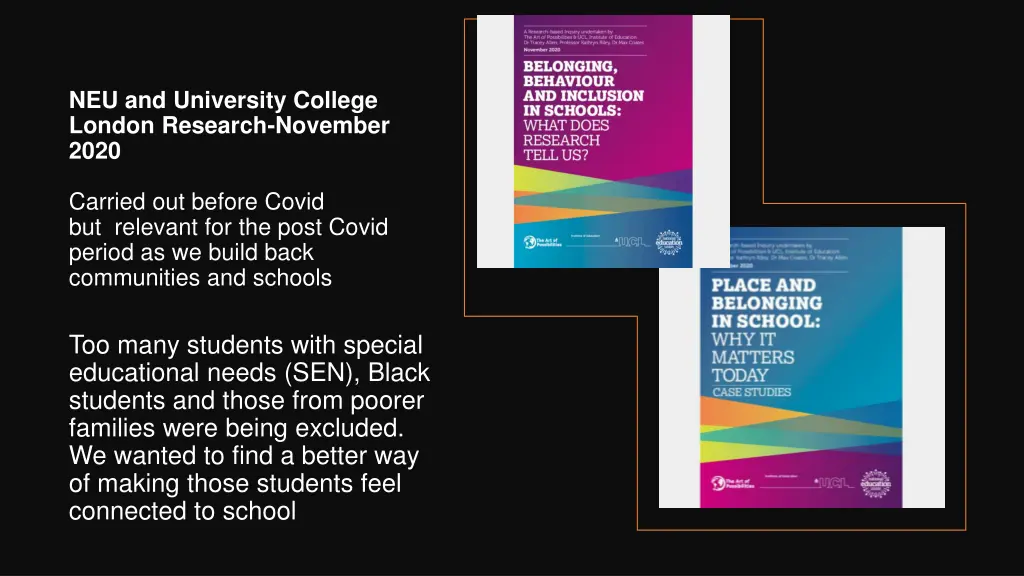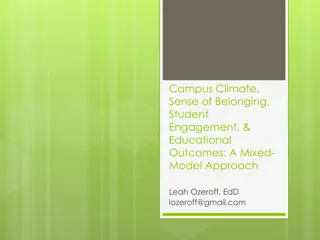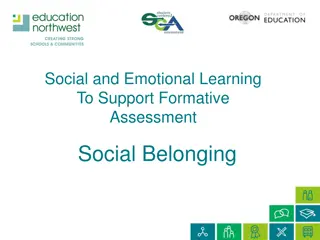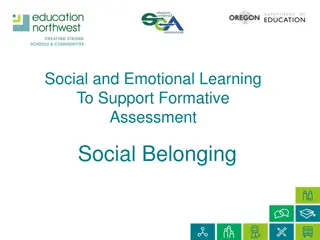
Creating Belonging in Schools: Addressing Exclusion and Promoting Connection
Research conducted by NEU and University College London highlights the exclusion of students with special educational needs, Black students, and those from poorer families. The study focuses on fostering a sense of belonging in schools through leadership, culture shaping, and promoting independence in learning. It also discusses the impact of lockdown on children's mental health and well-being, emphasizing the need for support and understanding during the post-Covid period.
Download Presentation

Please find below an Image/Link to download the presentation.
The content on the website is provided AS IS for your information and personal use only. It may not be sold, licensed, or shared on other websites without obtaining consent from the author. If you encounter any issues during the download, it is possible that the publisher has removed the file from their server.
You are allowed to download the files provided on this website for personal or commercial use, subject to the condition that they are used lawfully. All files are the property of their respective owners.
The content on the website is provided AS IS for your information and personal use only. It may not be sold, licensed, or shared on other websites without obtaining consent from the author.
E N D
Presentation Transcript
NEU and University College London Research-November 2020 Carried out before Covid but relevant for the post Covid period as we build back communities and schools Too many students with special educational needs (SEN), Black students and those from poorer families were being excluded. We wanted to find a better way of making those students feel connected to school
Interlocking elements in creating the conditions for belonging Interlocking elements in creating conditions for belonging I. Leadership: shapes culture -Leaders shape the school culture -Contextual leadership -Authenticity "be who you are" II. Culture: shapes learning and behaviour -Behaviour agenda owned by staff and students -common language and a shared set of practices III. Leadership and Culture: shape agency and belonging -belonging and behaviour are closely linked -teachers are the key influencers for children
Theme 2: Theme 2: Culture Shapes Learning and Shapes Learning and Behaviour Behaviour Culture Student Learning and Independence Children's learning and their independence are most important to the school. Staff and pupils share an understanding about the process The diagram shows what is happening in Hargrave school to create the climate for independent learners to flourish. The children at Hargrave school see it as a place of joy and excitement.
Theme III: Leadership and Culture Theme III: Leadership and Culture When you feel you belong... You can be more creative, innovative and confident You feel respected and accepted. You will not feel the need to bully others You ll stay longer in an organisation and make more of a contribution You have a sense of well-being and agency. You will feel able to stand-up to bullies and report bullying You feel more involved and committed to your learning/work
The Impact of Lockdown on the Mental Health The Impact of Lockdown on the Mental Health & Wellbeing of Children & Wellbeing of Children Members Quotes For many of our children the impact on mental health has been greater from the strains put on family relationships when parents have tried to home school - this caused many conflicts within homes and in a great number of cases home learning was unable to be completed. Members Quotes I m head of Year 11 and I am dealing with more cases of anxiety, poor behaviour, lack of motivation, low mood, tearful students and eating disorders than ever before. Children are more school anxious and have heightened worries about the virus. Many have had increased home issues as a result of COVID lockdown such as domestic violence and neglect, and this had impacted on their mental health. Some parents have been affected mentally and the children are having to care for their parents wellbeing. Lots of young children have missed out on a significant amount of social and emotional interactions over a sustained period of time. They are still missing out on opportunities to develop their relationships out of school and many are struggling to cope with the school day.
The Impact of The Pandemic on SEND students The Impact of The Pandemic on SEND students Members commented that the impact of the pandemic on disabled pupils and those with special educational needs was very variable. Some pupils had responded very positively to being at home, experiencing less social anxiety, while those with autism often enjoyed/benefitted from more individual attention and less social interaction. This was particularly where there was good support from the home environment. Fewer outside specialists were able to come in to support the needs of SEND children. Fewer staff to provide intervention for SEND children. Waiting lists are even longer for specialists to come in and diagnoses being made. Whilst some have flourished or at least not been adversely affected, pupils from disadvantaged homes have struggled both emotionally and educationally.
SUMMARY SUMMARY We are looking for a better way of making students feel more connected to school Students who feel a sense of belonging have increased wellbeing and motivation A sense of belonging reduces student absenteeism & has other positive social outcomes Both children and their parents suffered with mental health issues during lockdown SEND children and children from disadvantaged homes have struggled emotionally and educationally as a result of lockdown Helen Porter NEU Executive Member






















